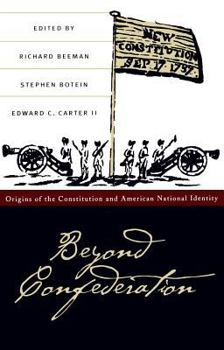Beyond Confederation: Origins of the Constitution and American National Identity
Select Format
Select Condition 
Book Overview
Beyond Confederation scrutinizes the ideological background of the U.S. Constitution, the rigors of its writing and ratification, and the problems it both faced and provoked immediately after... This description may be from another edition of this product.
Format:Hardcover
Language:English
ISBN:0807817198
ISBN13:9780807817193
Release Date:March 1987
Publisher:Omohundro Institute and Unc Press
Length:376 Pages
Weight:1.65 lbs.
Dimensions:1.3" x 6.0" x 9.0"
Customer Reviews
1 rating
Supplementary, but interesting aspects of our founding
Published by Thriftbooks.com User , 14 years ago
This book is a collection of essays by noted colonial period historians that analyze several aspects of our constitutional founding. Most of the entries are interesting, yet in such collections the reader is somewhat burdened with the constant shifting of gears. While not all of the essays are appealing, the best pieces are worth one's while. A theme that seems to run through these selections is that the Founders only minimally knew what they were creating. Matters developed much differently over the ensuing decades than was anticipated. Gordon Wood, in "Interests and Disinterestedness," dissects the pretensions of the Federalists in their attempt to incorporate their "virtue" and "disinterest" into the Constitution, while taking steps to restrain the direct political voice of "middling" folk. As the author notes, anti-Federalists saw through their rhetoric, correctly understood the aristocratic implications, and disputed their claims of disinterestedness. In fact, the unruly democracy of the ensuing decades seems to vindicate the strength of the anti-Federalists, despite their lack of success in stopping the ratification. Lance Banning, in "The Practical Sphere of a Republic," emphasizes the learning that took place at the Convention. Madison's nationalism became transformed - a middle ground was achieved. His "practical sphere of a republic" became a "federal system of republics... where the will of the majority would be refined and purified by passing it successively through different filters. Authority would be distributed among two sets of government branches, state and general." Paul Finkelman, in "Slavery and the Constitutional Convention," clearly demonstrates the impact that slavery had in almost every significant issue debated in the Convention. In the end, Southerners gained protections and accommodations for slavery, while conceding little. The three-fifths clause gave the Southern states added power in Congress and well as in the electoral college. Their cash crops for export would not be taxed. And the remainder of the nation was required to deliver up fugitives and come to the aid against any slave insurrections. Objections to these provisions were minimal. The northern states only gained the right to pass commercial legislation by a simple majority. Of course, all of this only delayed a final, ferocious reckoning. "The Structure of Politics at the Accession of George Washington," by Jack Rakove, has nothing to do with Washington but is an interesting examination of whether the Constitution was actually structured such that it would serve as a "filtration of talent" for those gaining political office - a desire of the elites at the Convention - and, if so, was that end accomplished. The author first notes that the Constitution imposes no property requirements for holding office or for voting, and, furthermore, leaves to the states the manner of electing Congressmen, be it by district or statewide. The first Congress was large





